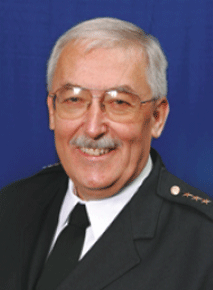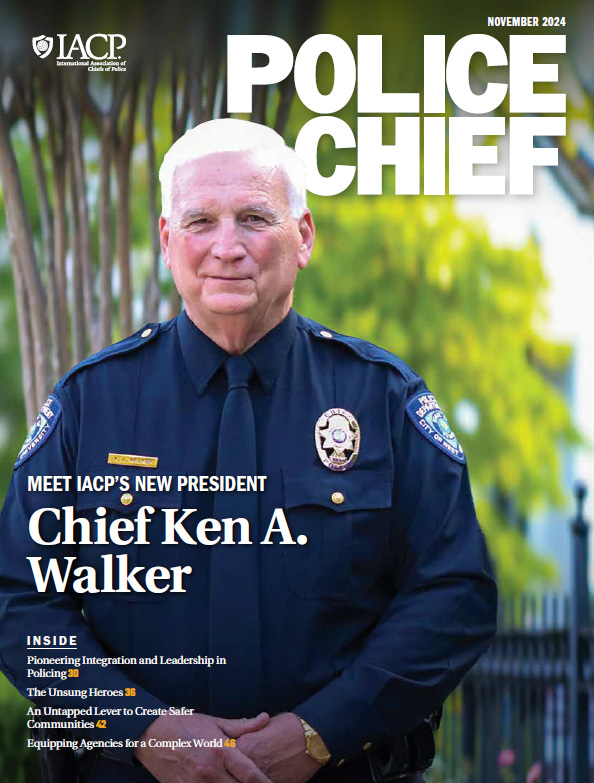
As police chiefs, we have many critical responsibilities. We are responsible for ensuring that our communities are policed effectively, providing expert guidance on public safety to our elected leaders, and continually ensuring that our officers earn and maintain the trust and respect of the communities we serve.
No responsibility, however, is more important than that of protecting our officers from harm. In recent years, we have made tremendous advances in ensuring that our officers are better equipped, better trained and, ultimately, better protected from the unavoidable dangers inherent in law enforcement. Advances in safety equipment and technology and improvements in threat awareness and de-escalation tactics have made a significant contribution to reducing the potential for physical injury and harm suffered by our law enforcement officers.
But we must not be content with only protecting our officers from physical harm; we must also take aggressive action to protect their mental health and well-being.
There can be no argument that law enforcement is one of the most stressful and demanding professions of modern times. The risks and pressures imposed on law enforcement officers take a mental and emotional toll on all of us, but differences in circumstances and in individuals can lead to different reactions. Some officers continue to function effectively under extreme and prolonged stress while others develop psychological problems that can range from mild to catastrophic. These problems may take many forms such as alcohol abuse, excessively aggressive conduct, and numerous other behaviors that can be very harmful to the officer and his family, the department, and the public.
That is why it is incumbent upon us, as police leaders, to develop and implement policies and procedures that provide for early detection of these problems and provide assistance and other mechanisms to officers who need help in addressing these issues.
To assist chiefs in this critical effort, the IACP has made a number of resources available. Through our National Law Enforcement Policy Center, the IACP has developed a model policy that is designed to provide chiefs with guidance as they seek to address this issue within their departments. In addition, through the efforts of its Psychological Services Section, the IACP has developed a number of guidelines addressing issues related to peer counseling, officer involved shootings, fitness-for-duty evaluations, and consulting police psychologists.
Another area of focus for the IACP is the needs of returning combat veterans. These officers, just like their counterparts who have experienced traumatic events (shooting, investigating sexual abuse, fatal fires, crashes, and so forth) may need assistance in returning to and coping with the stresses associated with law enforcement activities. That is why, as part of our Returning Combat Veterans Project, the IACP will be developing guidebooks for both veterans and law enforcement leaders that will provide tips and tactics to assist these officers in making the transition from combat operations to civilian law enforcement activities. I personally understand the traumatic experiences and the effect these events can have on a returning veteran. As a 20-year old combat medic returning from service in Vietnam, I was plagued by the demons of my experiences for many years. It was not until I sought professional assistance that these issues were resolved.
Of course, the most critical issue is addressing law enforcement officer suicide. Each year, more law enforcement officers die from suicide than are killed in the line of duty. Unfortunately, despite this troubling reality, many agencies lack the resources to prevent officer suicides from occurring and are unprepared to respond effectively when it does occur. That is why the IACP joined with U.S. Department of Justice, Bureau of Justice Assistance to develop Preventing Law Enforcement Officer Suicide: A Compilation of Resources and Best Practices.
This CD-ROM, which is available through order on the IACP Web site, is a collection of materials from leading agencies around the country. It contains sample suicide prevention print materials, presentations, training videos, reference publications, and other information that is designed to provide the law enforcement community with the tools necessary to effectively address this critical problem. This CD includes the following:
- Developing a Law Enforcement Suicide Prevention Program—five steps for initiating a campaign using public health principles
- Sample Suicide Prevention Materials—examples of brochures, posters, wallet cards, and program summaries
- Sample Training Materials—examples of training presentations, videos, and brochures used by law enforcement agencies
- Sample Presentations—examples of PowerPoint presentations on a wide range of suicide-related topics, both for the general public and for law enforcement specifically
This CD and the other resources are incredibly useful, and I urge you take advantage of them.
It is imperative that we, as police chiefs, address this problem head on. We set the tone for our departments, and it is up to us to make safeguarding the mental health of our officers a priority. We must create an environment in our organizations, where law enforcement personnel seeking assistance for mental health issues do not feel it is a sign of failure or weakness, but rather it is a sign of strength. Failure to do so is simply unacceptable.
Simply put, it is our responsibility to ensure that our officers are protected from all of the dangers that they face each and every day. We cannot let them down. ■


